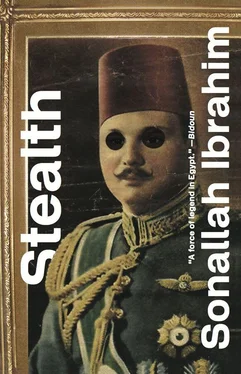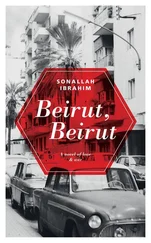The light from the electric lamp grows dim. She gets up to prepare the gas lamp, thinking that the electricity is going to be cut soon. He shouts at her: “Put on some slippers.” She comes back with a plate full of persimmon seeds. She sits down cross-legged and her robe comes up to show her thighs. I sit in front of her on the floor. I take a few seeds. She hides her hands behind her back, then puts them in front of her in fists. She rests them on her bare thighs. I say: “Eeny Meeny, Sayyid Ameeny. Put it all, on, this, one.” I point to her right fist and she pulls back her hand, laughing. My hand lands on her bare thigh. Father says: “It’s chubby, isn’t it?” I grab the flesh of her thigh and answer: “Chubby.”
She says: “Even the hebb al’azziz snacks cost more. Everything’s gone up.” Father says Egyptians have always suffered from bad rulers and rising prices. In the days of the Mamelukes, they suffered from the rising taxes to the point where they chanted in the streets: “Hey Bardissi, why do you squeeze me? You eat off my bankruptcy!” I ask him to tell us one of his stories. He says he once went on a trip to Turkey and toured the magnificent Yildiz Palace. Its bathroom was pure marble with fancy French toilets. He felt nature’s call, so he sat on one. When he was finished, he turned the tap and was surprised to feel something strange brushing against his thighs, as though it were human hands. He jumped up and found tiny streams of water running down in all different directions.
You can tell she is impressed: “They did that in the days of the caliph?”
“What do you mean caliph ? You don’t understand a thing. When Istanbul was destroyed in the earthquake and they came to pull the people up from underneath the rubble they found all the men and women clinging to each other like this.” He locks the fingers from one hand into the other.
“Aren’t they Muslims?”
“The real Islam was in the days of the prophet and the Rashidian Caliphate.” He tells us about the prophet and his devoutness. Then about Omar Ibn Khattab and his sense of justice. Then Ali Ibn Abi Talib and his two sons.
I ask him if he participated in the revolution of 1919 and he says: “I sure did. I left the bureau where I worked with the other clerks. We climbed into a carriage and rode through the streets, chanting ‘Down with British rule,’ and ‘Long live Saad Zaghloul.’ ”
Fatima asks him: “Have you seen lots of countries, Sidi?”
He says: “Not many.”
“Tell us about them, Sidi.”
He says: “I’ll tell you, but give me the jar first.” She pushes herself up and goes to get one of the three jars placed on the tray resting on top of the ledge surrounding the balcony, so they can cool. He sips from it and takes a deep breath. He tells her to make sure the other two are full. She takes one inside to fill it up. She comes back and puts it on the tray between the lemon and the cucumber.
Father sits back in his chair. He lights up his dark colored cigarette. He says: “The first time was when I went to Sudan with the army. Um Nabila, God rest her soul, came along with me. She was pregnant with Nabila too. We rented a whole house. It was hot as hell. I looked for somebody at the place to help us get our cots unfolded but there wasn’t anyone around. I saw two guys wearing white, resting under a tree. They were each propped up on one elbow playing a game of tic-tac-toe. One of them was chewing on something that made his teeth as black as coal. I called out: ‘Hey, you guys!’ but it was like calling to the wind. I heard Um Nabila scream. I ran back and found her back against the wall. Her face was yellow and her eyes were fixed on an untied cloth bundle and a tiny bug, a scorpion with its tail in the air. I went to smash it but I missed. It ran to the wall and escaped through the window. Um Nabila threw herself into my arms. I gave her a glass of water to drink. We had to sleep inside a big mosquito net and we put cans full of water under each leg of the bed.”
Fatima puts her hand on her chest and stretches her legs out: “A person would be right to never go abroad and stay at home his whole life.”
“Do you think staying here was that safe?”
He tells us about the draft and how people were trying to escape being put in the army. The poor were maiming themselves to get out of it. Cutting an arm or leg or even gouging an eye. The rich were all bribing their way out of it, paying what they called “a replacement charge.” Thieves and robbers started to target the people who took the payoffs.
He fans his face with his cap. “I was sleeping with a revolver under my pillow. That and an envelope full of money. At night I woke up once to the sound of steps on the roof. I took the revolver out and got up really slowly. I stood in the dark and then yelled out strong and bold: ‘Who’s there?’ No one answered. Fifteen minutes passed and no sound. After a while, I heard the dawn call to prayer and went back to sleep.”
Fatima looks at him amazed: “Oh my. You have a heart of steel, Sidi.” He goes on, saying that being on the road wasn’t safe either. Especially in the south. At night, gangs would gather along the side of the road, coming back from a soirée at the house of some police chief or local official. The night would be black like kohl. His hand held his money belt real tight and his eyes darted around in the dark. “My eyesight was 20/20 back then. Once I was hit by a bullet.” He points to a scar on his forehead, just between his eyes. “Once I was stabbed with a switchblade.” He turns his head so we can see another scar on the nape of his neck.
I ask: “Do you still have the revolver?”
“No. The English were collecting all firearms, so I hid it in the garden of the villa. Probably, Nabila’s uncle who was living with us stole it and sold it.”
Silence echoes around us. After a little while, he says: “The important thing is that one’s got to know how to act. Once I was riding the tram. Two guys got on. One stood on the stairs to the right and the other jumped off to the left. He asked me what time it was. I suspected they were pickpockets. I reached into my pocket and pulled out a closed hand. I pretended to look at it and told him it’s about such and such. The guy on the right burst out laughing and said: ‘Leave him alone, champ. It’s clear he’s just like us.’ ”
Fatima laughs and slaps her hand on her bare thighs. I ask him to tell us about Hafiz Naguib. He says that he was a sly thief and an international crook. He became famous for his ability to disguise himself and escape from the police. “Once they caught him in the disguise of an Italian baron, another time as the Turkish ambassador. A third time he was dressed like a priest. Another time he was standing in a cage in the courtroom. He stood up to hear his sentence. The judge turned for a second, then he couldn’t find him. Up until today, still no one knows how he escaped from the cage.”
She says: “By the prophet, Sidi, please please tell us one of Juha’s tales.” He says that once upon a time Juha was living in a house. After a couple days, he started complaining to the landlord about a rumbling sound coming from the ceiling that made him afraid it was going to come crashing down. The landlord reassured him by saying that by the grace of God the ceiling was sound, so Juha says: “That’s exactly what I’m afraid of.” “Why?” he asks. He answers back: “I don’t want God’s grace to rain down upon us.” Father bursts out laughing until tears flow down his cheeks and he starts to wipe them away, saying: “May our Lord keep us safe.” I ask him why he says this and he tells me that happy times are always followed by bad ones. We have our breakfast on a boat off Rod el Farag Isle in the Nile. Ful beans and heavy cream with honey. The wooden table is painted blue. Mother is humming a tune. We get off the boat and we walk through a farm. We go into a fruit orchard. My father buys bananas and dates. The owner of the fruit stand invites me to eat guava. I eat until I’m stuffed. We leave the fruit stand. I trip on a drain cover. I fall down and hit my head on it. I throw up all that I’ve eaten.
Читать дальше












